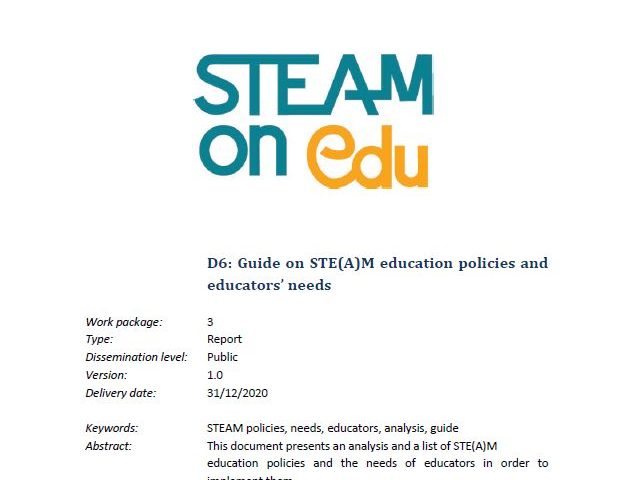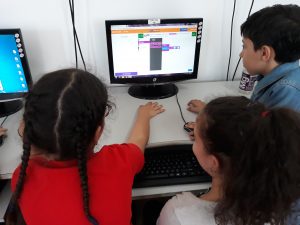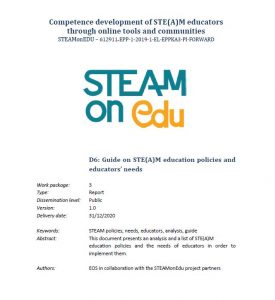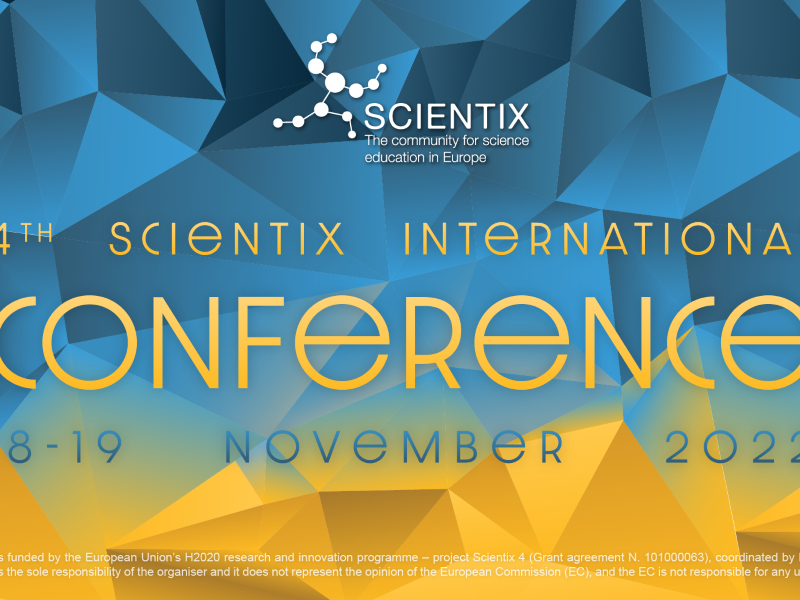A Guide on STE(A)M education policies and educator’s needs


STEAMonEdu project consortium developed a Guide on STE(A)M education policies and educator’s needs that was launched at the end of December 2020. The guide presents in a comprehensive way the STE(A)M education policies identified and/or produced by the community members and the needs of the educators in order to implement them. This document contains existing needs and policies and a selection of the policies produced by the community members.
Project partners developed a methodological framework in order to identify, select, and analyze STE(A)M in education policies.
The process to identify and collect policies has been supported by desk research as well as data collection through online surveys. In the context of STEAMonEdu project, the following STE(A)M policies have been collected and analyzed in order to be included in the guide:
- EU policies
- National (governmental) policies
- Regional policies
- Institution level policies (e.g. schools)
The analysis of the collected policies has been carried out by using a series of criteria and policy questions. Beyond analyzing the policies, the STEAMonEdu consortium performed an analysis of the policy context in each project country and at the EU level, by researching a number of existing publications as well as by gathering information from the wider project community.
An analysis of the efficiency and impact of STEAM educational policies at EU and national level was conducted by project consortium and all these findings were included and integrated in the guide together with a short analysis of the STE(A)M educators needs.
Main conclusions drafted after conducting the research and policy analysis activity are the following:
- Quantity and quality of STE(A)M policies. The research performed within the project identified only 20 policies both at EU level and in the five countries of the project partners. The quantity and the quality of STE(A)M policies are still very low, and this translates into education systems that are not fully reformed in order to respond to the current societal challenges and opportunities.
- STEAM vs STEM. STEAM is largely unknown as a concept, and, as a consequence, it is not addressed by policy makers at national level, as the large majority of policy initiatives are related to STEM only. At EU level, the new Digital Education Action Plan introduces the concept of STEAM only to encourage women to consider technical studies. Despite an official communication between the EU Parliament and the European Commission, and a funding programme to promote integration of STEAM, the challenge to achieve a full integration of the STEAM disciplines remains.
- Integration of STEM. Significant policy support for integration of STEM in education can be found at EU level. STEM Education is thus currently recognised as an effective integrated and multidisciplinary approach able to meet the growing demands of businesses and allowing professionals to excel and perform outstandingly in a highly technical and evolving fast-paced environment. Most of the EU countries have integrated STEM in education by now at various levels, but impact is still low due to the lack of proper policy support.
- Efficiency of STE(A)M policies. Most of the identified policies are still ongoing or do not include a monitoring and evaluation framework, thus it is very difficult to assess the efficiency and impact of these policies. In all five countries where the research has been performed, very little information has been found regarding policy efficiency. Ultimately, there is currently no official and transversally accepted framework which enables comparisons across different EU member states. The OECD’s PISA programme offers insight on the separate disciplines, but does not offer a full assessment of STEAM opportunities and practices.
- STE(A)M educators’ needs. The research identified a large and diverse set of needs for the STE(A)M educators, from lack of infrastructure to teach STE(A)M disciplines to low levels of confidence and competences, and to difficulty to assess and evaluate. This only proves that there is an urgent need for coordinated support from the policy side both at EU and at the national level.
By EOS Romania
Featured image from the Microbit class at Nicolae Titulescu Theoretical High School in Slatina, Romania


